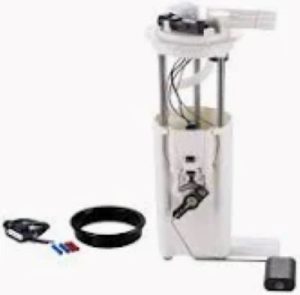A fuel pump leak can be diagnosed by observing that the pressure has dropped from what is usual in the V and other gasoline engines (40 to 70 psi) at idle. Leaks make the pump do more work, but inhibit consistent fuel delivery and pressure can fall below normal by as high as 20%! When the pressure drops below the manufacturer's specification, a car may experience rough idle, engine misfire upon start-up or no-start condition. A fuel pressure gauge hooked up to the Schrader valve on the fuel rail could verify a lack of proper fuel pressure that may indicate a leak.
Fuel Pump Leak: Fuel may accumulate on the ground under your car at a gas station or materialize as drips of gasoline on roadways. It is another tell-tale sign of a leak — the smell of gasoline either inside or around the car, especially when parked. Fuel leaks mean you are pissing away miles as a loss of efficiency, costing upwards of 15% of your fuel economy if the pump isn't getting gas due to the leak. Moreover, facilities surrounding the pump or lines can also ignite around hot engine parts.
It is absolutely necessary to check the fuel pump, including its lines for cracks, worn seals or connections. Some cars have been known to use metal fuel lines and gasoline tends to rust the body of the vehicle it leaks on, this wear and tear can only get worse with age. Also wearing out during use are the rubber fuel lines which, according to MotorTrend, have a 100,000-mile lifespan and can degrade over time -- resulting in leaks at their fittings or connections. High-performance applications, such as a car with larger-than-stock aftermarket upgrades which require the use of superior pumps by Kemso needs to be excruciatingly meticulous when it comes to checking lines and fittings regularly, especially in high-pressure configurations exceeding 90 psi levels where just a small leak can snowball out of control.

A: One of the most frequently asked questions is, “How Does a Fuel Pump Leak Affect Engine Performance”? That is answered by a reduction in fuel pressure that results in incomplete fuel delivery and engine misfires (or can cause it to stall or lose power completely). At worst, a fuel pump leak will result in the entire pump failing and requiring an expensive replacement.
Other methods for verifying a fuel pump leak include testing the fuel system with a pressure gauge, visual inspection for leaks and replace worn parts. A leak-free and reliable operation are the key factors for maintaining your performance fuel systems.
To find out more about maintaining your fuel pump and products that help prevent leaks, stop by Fuel Pump — Kemso has quality solutions for a variety of vehicle applications.
